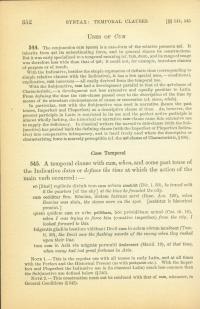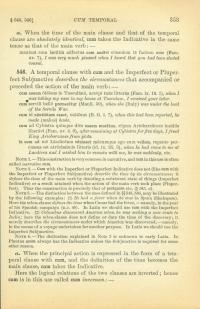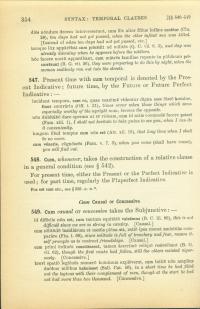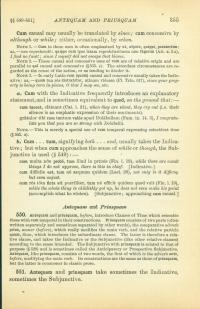544. The conjunction cum (quom) is a case form of the relative pronoun quī. It inherits from quī its subordinating force, and in general shares its constructions. But it was early specialized to a temporal meaning (cf. tum, dum), and its range of usage was therefore less wide than that of quī; it could not, for example, introduce clauses of purpose or of result.
With the indicative, besides the simple expression of definite time (corresponding to simple relative clauses with the indicative), it has a few special uses—conditional, explicative, cum inversum—all easily derived from the temporal use. With the subjunctive, cum had a development parallel to that of the quī clause of characteristic, a development not less extensive and equally peculiar to Latin. From defining the time the cum clause passed over to the description of the time by means of its attendant circumstances of cause or concession (cf. since, while).
In particular, cum with the subjunctive was used in narrative (hence the past tenses, imperfect and pluperfect) as a descriptive clause of time. As, however, the present participle in Latin is restricted in its use and the perfect active participle is almost wholly lacking, the historical or narrative cum clause came into extensive use to supply the deficiency. In classical writers the narrative cum clause (with the subjunctive) has pushed back the defining clause (with the imperfect or pluperfect indicative) into comparative infrequency, and is itself freely used where the descriptive or characterizing force is scarcely perceptible (cf. the quī clause of Characteristic, § 534).
Cum Temporal
545. A temporal clause with cum (when) and some past tense of the indicative dates or defines the time at which the action of the main verb occurred.
eō [lituō] regiōnēs dīrēxit tum cum urbem condidit (Div. 1.30)
He traced with it the quarters [of the sky] at the time he founded the city.
Cum occīditur Sex. Rōscius, ibīdem fuērunt servī. (Rosc. Am. 120)
When Roscius was slain, the slaves were on the spot.
[occīditur is historical present.]
Quem quidem cum ex urbe pellēbam, hōc prōvidēbam animō. (Cat. 3.16)
When I was trying to force him (Conative Imperfect) from the city, I looked forward to this.
Fulgentīs gladiōs hostium vidēbant Deciī cum in aciem eōrum inruēbant (Tusc. 2.59)
The Decii saw the flashing swords of the enemy when they rushed upon their line.
tum cum in Asiā rēs māgnās permultī āmīserant (Manil. 19)
at that time, when many had lost great fortunes in Asia
Note 1— This is the regular use with all tenses in early Latin, and at all times with the perfect and the historical present (as with postquam etc.). With the imperfect and pluperfect the indicative use is (in classical Latin) much less common than the subjunctive use defined below (§ 546, below).
Note 2— This construction must not be confused with that of cum (whenever) in general conditions (§ 542).
a. When the time of the main clause and that of the temporal clause are absolutely identical, cum takes the indicative in the same tense as that of the main verb.
Maximā sum laetitiā adfectus cum audīvīcōnsulem tē factum esse (Fam. 15.7)
I was very much pleased when I heard that you had been elected consul.
546. A temporal clause with cum and the imperfect or pluperfect subjunctive describes the circumstances that accompanied or preceded the action of the main verb.
Cum essem ōtiōsus in Tusculānō, accēpī tuās litterās. (Fam. 9.18.1)
When I was taking my ease in my house at Tusculum, I received your letter.
cum servīlī bellō premerētur (Manil. 30)
when she (Italy) was under the load of the Servile War
Cum id nūntiātum esset, mātūrat (B. G. 1.7)
When this had been reported, he made (makes) haste.
Cum ad Cybistra quīnque diēs essem morātus, rēgem Ariobarzānem īnsidiīs līberāvī. (Fam. 15.4.6)
After remaining at Cybistra for five days, I freed King Ariobarzanes from plots.
Is cum ad mē Lāodicēam vēnisset mēcumque ego eum vellem, repente percussus est atrōcissimīs litterīs. (id. 9.25.3)
When he had come to me at Laodicea and I wished him to remain with me, he was suddenly, etc.
Note 1— This construction is very common in narrative, and cum in this use is often called narrative cum.
Note 2— Cum with the imperfect or pluperfect indicative does not (like cum with the imperfect or pluperfect subjunctive) describe the time by its circumstances; it defines the time of the main verb by denoting a coëxistent state of things (imperfect indicative) or a result attained when the action of the main verb took place (pluperfect). Thus the construction is precisely that of postquam etc. (§ 543.a).
Note 3— The distinction between the uses defined in §§ 545 - 546 above, may be illustrated by the following examples:
(1) He had a fever when he was in Spain (Shakespeare). Here the when clause defines the time when Cæsar had the fever—namely, in the year of his Spanish campaign (B.C. 49). In Latin we should use cum with the imperfect indicative.
(2) Columbus discovered America when he was seeking a new route to India. Here the when clause does not define or date the time of the discovery; it merely describes the circumstances under which America was discovered—namely, in the course of a voyage undertaken for another purpose. In Latin we should use the imperfect subjunctive.
Note 4— The distinction explained in Note 3 is unknown to early Latin. In Plautus quom always has the indicative unless the subjunctive is required for some other reason.
a. When the principal action is expressed in the form of a temporal clause with cum, and the definition of the time becomes the main clause, cum takes the indicative.
Here the logical relations of the two clauses are inverted; hence cum is in this use called cum inversum.
Diēs nōndum decem intercesserant, cum ille alter fīlius īnfāns necātur. (Clu. 28)
Ten days had not yet passed, when the other infant son was killed.
[Instead of when ten days had not yet passed, etc.]
iamque lūx appārēbat cum prōcēditad mīlitēs (Q. C. 7.8.3)
and day was already dawning when he appears before the soldiers
Hōc facere noctū apparābant, cum mātrēs familiae repente in pūblicum prōcurrērunt. (B. G. 7.26)
They were preparing to do this by night, when the women suddenly ran out into the streets.
547. Present time with cum temporal is denoted by the present indicative; future time, by the future or future perfect indicative.
Incidunt tempora, cum ea, quae maximē videntur dīgna esse iūstō homine, fīunt contrāria. (Off. 1.31)
Times occur when those things which seem especially worthy of the upright man, become the opposite.
Nōn dubitābō dare operam ut tē videam, cum id satis commodē facere poterō. (Fam. 13.1)
I shall not hesitate to take pains to see you, when I can do it conveniently.
longum illud tempus cum nōn erō(Att. 12.18)
that long time when I shall be no more
Cum vēneris, cōgnōscēs. (Fam. 5.7.3)
when you come (shall have come), you will find out.
548. Cum (whenever) takes the construction of a relative clause in a general condition (see § 542). For present time, either the present or the perfect indicative is used; for past time, regularly the pluperfect indicative. For est cum etc., see § 535.a, Note 3.
Cum Causal
549. Cum causal or concessive takes the subjunctive.
Id difficile nōn est, cum tantum equitātū valeāmus. (B. C. 3.86)
This is not difficult since we are so strong in cavalry.
[Causal]
Cum sōlitūdō īnsidiārum et metūs plēna sit, ratiō ipsa monet amīcitiās comparāre. (Fin. 1.66)
Since solitude is full of treachery and fear, reason itself prompts us to contract friendships.
[Causal]
Cum prīmī ōrdinēs concidissent, tamen ācerrimē reliquī resistēbant. (B. G. 7.62)
Though the first ranks had fallen, still the others resisted vigorously.
[Concessive]
Brevī spatiō legiōnēs numerō hominum explēverat, cum initiō nōn amplius duōbus mīlibus habuisset. (Sall. Cat. 56)
In a short time he had filled out the legions with their complement of men, though at the start he had not had more than two thousand.
[Concessive]
Cum causal may usually be translated by since; cum concessive by although or while either, occasionally, by when.
Note 1— Cum in these uses is often emphasized by ut, utpote, quippe, praesertim.
Nec reprehendō: quippe cum ipse istam reprehēnsiōnem nōn fūgerim. (Att. 10.3 A)
I find no fault; since I myself did not escape that blame.
Note 2— These causal and concessive uses of cum are of relative origin and are parallel to quī causal and concessive (§ 535.e). The attendant circumstances are regarded as the cause of the action, or as tending to hinder it.
Note 3— In early Latin cum (quom) causal and concessive usually takes the indicative.
quom tua rēs distrahitur, utinam videam (Pl. Trin. 617)
since your property is being torn in pieces, O that I may see, etc.
a. Cum with the indicative frequently introduces an explanatory statement, and is sometimes equivalent to quod (on the ground that).
Cum tacent, clāmant. (Cat. 1.21)
When they are silent, they cry out.
(i.e. their silence is an emphatic expression of their sentiments)
Grātulor tibi cum tantum valēsapud Dolābellam. (Fam. 9.14.3)
I congratulate you that you are so strong with Dolabella.
Note— This is merely a special use of cum temporal expressing coincident time (§ 545.a, above).
b. Cum . . . tum, signifying both . . . and, usually takes the indicative; but when cum approaches the sense of while or though, the subjunctive is used (§ 549, above).
cum multa nōn probō, tumillud in prīmīs (Fin. 1.18)
while there are many things I do not approve, there is this in chief.
[Indicative]
cum difficile est, tumnē aequum quidem (Lael. 26)
not only is it difficult but even unjust.
cum rēs tōta ficta sit puerīliter, tumnē efficit quidem quod vult (Fin. 1.19)
while the whole thing is childishly got up, he does not even make his point
[accomplish what he wishes; subjunctive, approaching cum causal]




